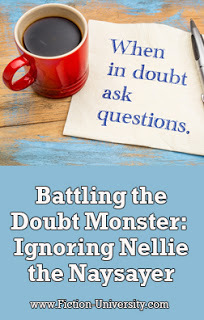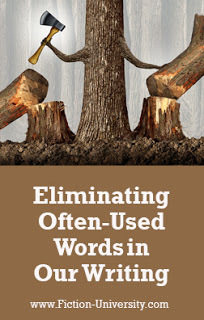Janice Hardy's Blog, page 78
April 11, 2019
Juggling Two Author Platforms, Is it Worth it?
 By Charity Bradford, @charitybradford
By Charity Bradford, @charitybradfordPart of The Writer’s Life Series
JH: It’s hard enough managing one author career, but what happens when you have a pen name that needs equal treatment? Please help me welcome Charity Bradford to the lecture hall today, to share tips on juggling multiple author platforms.
Charity Bradford has been a voracious reader ever since her 5th grade teacher introduced her to the world of books with WHERE THE RED FERN GROWS. She soon became kindred spirits with Anne Shirley and got lost in the worlds of Card, McCaffrey, Bradbury, and Nagata. By college, she was sewing her own Starfleet uniform and developing her alter-ego as a comic book sidekick. She lives in Northwest Arkansas with her hubby and four kids. Some of her guilty pleasures include binge watching Doctor Who and Ancient Aliens. Charity also writes clean contemporary romance under the name River Ford.
Website | Website (River Ford) Newsletter Sign-up | Charity on Facebook | River on Facebook |Twitter | Pinterest | Instagram
Take it away Charity…
Continue ReadingWritten by Janice Hardy. Fiction-University.com

Published on April 11, 2019 05:46
April 9, 2019
Never Suffer Writer’s Block Again
 By Laurence MacNaughton, @LMacNaughton
By Laurence MacNaughton, @LMacNaughton Part of the How They Do It Series (Contributing Author)
JH: Not being able to write sucks. It's emotionally draining and can make us question our entire career choice. Laurence MacNaughton has tips on never being blocked again.
Have you ever sat down to write, and everything you wrote seemed terrible? Every writer has felt that way, at one time or another. Here's the uncomfortable truth about those critical thoughts: they can actually help you become a better writer. But only if you know how to recognize those thoughts for what they are, and then train yourself to have them at the right time.
There are two sides to your creative process.
The creative side of your writing process helps you get the rough draft down on paper.
The critical side, on the other hand, helps you revise and polish the final draft.
Continue ReadingWritten by Janice Hardy. Fiction-University.com

Published on April 09, 2019 03:00
April 6, 2019
Real Life Diagnostics: Does This Romantic Thriller Opening Work?
 Critique By Maria D'Marco
Critique By Maria D'MarcoReal Life Diagnostics is a weekly column that studies a snippet of a work in progress for specific issues. Readers are encouraged to send in work with questions, and we diagnose it on the site. It’s part critique, part example, and designed to help the submitter as well as anyone else having a similar problem.
If you're interested in submitting to Real Life Diagnostics, please check out these guidelines.
Submissions currently in the queue: Two
Please Note: As of today, RLD slots are booked through April 20.
This week’s question:
Does this romantic thriller opening work?
Market/Genre: Romantic thriller
On to the diagnosis…
Continue ReadingWritten by Janice Hardy. Fiction-University.com

Published on April 06, 2019 03:00
April 5, 2019
Battling the Doubt Monster: Ignoring Nellie the Naysayer
 By Aliza Mann, @AlizaMannAuthor
By Aliza Mann, @AlizaMannAuthorPart of The Writer’s Life Series
JH: Self-doubt happens to most writers, but there are things we can do to get past it. Please welcome Aliza Mann to the lecture hall today to learn how to banish the doubt and get on with our writing.
Having developed a preoccupation with reading as a small child, Aliza’s mother would literally have to bribe her to go outside and play with her friends. After finding her first romance novel abandoned at a Detroit bus stop when she was fourteen (probably a little too young, but nevertheless), Aliza read it and was instantly hooked. Aliza lives in Michigan with the man of her dreams. Her youngest son is living in Ohio on a college campus, where he had obviously lost his mother’s phone number. Her smart and kind daughter is an entrepreneur and runs several businesses alongside her husband, a wonderful man who loves Harry Potter. When Aliza is not writing, she can usually be found on Twitter or taking hikes through her neighborhood. She loves trucks, movies that bring her to tears, baking, and Scrabble. Aliza is represented by Sara Megibow of KT Literary.
Website | Twitter | Goodreads | BookBub | Instagram |
Take it away Aliza…
Continue ReadingWritten by Janice Hardy. Fiction-University.com

Published on April 05, 2019 03:00
April 4, 2019
To Join or Not to Join a Professional Writers Organization: That is the Question.
 By Anne Armistead, @ArmisteadAnne
By Anne Armistead, @ArmisteadAnnePart of The Writer’s Life Series
JH: Deciding to join a professional writers’ organization isn’t always an easy choice. Anne Armistead takes to the podium today to share thoughts on making that decision.
Anne Armistead earned her English degree from the University of Georgia and her MFA in Creative Writing from Spalding University. She is a member of the Romance Writers of America (RWA) and the Georgia Writers of Romance (GRW), along with the National and Georgia Sisters in Crime (SinC) organization and the Society of Children’s Book Writers and Illustrators (SCBWI). She writes historical fiction children’s stories for Highlights Magazine under Sandra Havriluk. Dangerous Conjurings is her debut historical romance. Under the title Treacherous Hearts, it was the winner of the 2014 YA Fab 5 Wisconsin Romance Contest. Sandra has placed as a finalist the GRW’s Maggies contest, as well as in the RWA Daphne Contest and the YARWA Rosemary contest. Sandra has presented on panels at the 2018 Milton Literary Festival and will present at the October 2019 GRW conference Moonlight and Magnolia on the topic “Turning a Nugget of History into a Novel.” Her latest historical romance With Kisses from Cécile will be released early summer 2019.
Website | Goodreads | Facebook | Twitter | Instagram
Take it away Anne…
Continue ReadingWritten by Janice Hardy. Fiction-University.com

Published on April 04, 2019 03:00
April 3, 2019
An Age-Old Question: How Do You Show a Character's Age?
 By Janice Hardy, @Janice_Hardy
By Janice Hardy, @Janice_Hardy Some details are difficult to slip seamlessly into the narrative of a story, such as their age. Here's a look back at 2014 that offers tips on how to show a character's age without it feeling awkward.
In some novels, age doesn't matter. The characters are adults and if they're thirty or fifty the book unfolds pretty much the same way. Readers can assume the characters are about the same age as they are (if they're adults of course) and it still tracks.
Other novels read differently depending on the age of the character. Imagine a young adult (or worse--a middle grade) novel if you suddenly said the the protagonist was thirty. Nothing would feel normal and readers would likely assume that author couldn't write.
Continue ReadingWritten by Janice Hardy. Fiction-University.com

Published on April 03, 2019 04:00
April 2, 2019
Five Ways to Create a Memorable (and Distinguishable) Cast of Characters
 By Sarah McGuire, @fireplusalgebra
By Sarah McGuire, @fireplusalgebraPart of The How They Do It Series
JH: Creating unique characters readers can easily tell apart is a handy skill for any writer. Please help me welcome Sarah McGuire to the lecture hall today, with her great tips on creating memorable characters.
Sarah McGuire is a nomadic math teacher who sailed around the world aboard a floating college campus. She writes fairy tales and would be just fine if one day she opened a wardrobe and stumbled into another world. Coffee and chocolate are her rocket fuel. She wishes Florida had mountains, but she lives there anyways with her husband (who wrote this bio in less than three minutes!) and their family.
Website | Goodreads | Twitter |
Take it away Sarah…
Continue ReadingWritten by Janice Hardy. Fiction-University.com

Published on April 02, 2019 05:01
April 1, 2019
That Sounds Familiar: Eliminating Often-Used Words in Our Writing
 By Janice Hardy, @Janice_Hardy
By Janice Hardy, @Janice_HardyIt takes a lot of work to write well, and sometimes we go for what's easiest instead of what's original. Here's a heavily revised look at word packages.
During the drafting stage of a manuscript, some phrases and combinations of words tend to roll off our fingers and into our stories. Theses phrases aren’t clichés, per se, but they’ve been used so often by enough writers that they carry the same feeling as a cliché when readers read them.
They also tend to sound “right” to us, and that's the problem. We automatically use them without thinking about it, and that robs us of the chance to write something unique to our voice and style.
For example, I don’t know where the term “sodium lights” came from, I just know that I’d never heard of them, and then "The orange glow from the sodium lights” was in about half the novel I read for a while (published and critiqued). Even to this day, that phrase jumps out at me when I see it.
Continue ReadingWritten by Janice Hardy. Fiction-University.com

Published on April 01, 2019 03:00
March 31, 2019
Real Life Diagnostics: Revising for a Closer Point of View
 Critique By Janice Hardy, @Janice_Hardy
Critique By Janice Hardy, @Janice_HardyReal Life Diagnostics is a weekly column that studies a snippet of a work in progress for specific issues. Readers are encouraged to send in work with questions, and we diagnose it on the site. It’s part critique, part example, and designed to help the submitter as well as anyone else having a similar problem.
If you're interested in submitting to Real Life Diagnostics, please check out these guidelines.
Submissions currently in the queue: Zero
Please Note: As of today, RLD slots are open.
This week’s questions:
Am I closer to what is expected in close third person, or am I still off? Do you have a better sense of the scene/place he is? Can you see what is happening or do I need more description? Is there a character voice coming through now? Did I do better with hinting at magic sooner? Is there enough information about what he is trying to do?
Market/Genre: Fantasy
Note: This is a recent (and well done) revise and resubmit. Here’s the original if you’d like to see how the author revised.
On to the diagnosis…
Continue ReadingWritten by Janice Hardy. Fiction-University.com

Published on March 31, 2019 05:07
March 29, 2019
7 Tips for Collaborating on a Novel
 By Dan Brotzel, Martin Jenkins, & Alex Woolf @CrawleyGroup
By Dan Brotzel, Martin Jenkins, & Alex Woolf @CrawleyGroupPart of The Writer’s Life Series
JH: Collaborating with another writer can be a great way to bring an idea to life, but it also comes with its share of challenges. Please help me welcome Dan Brotzel to the lecture hall today, to share some tips on how to work with another writer.
Dan Brotzel’s first collection of short stories, Hotel du Jack, is due out in early 2020. He won the Riptide short story competition 2018, and was Asda Christmas Cracker gag champion, 2004. Martin Jenkins is a freelance writer, researcher and editor. His publications include an experimental novel A New Science of Navigation. Alex Woolf has written over 100 books for young people and old, both fiction and non-fiction, published by the likes of OUP, Ladybird, Heinemann and Watts.
Take it away guys…
Continue ReadingWritten by Janice Hardy. Fiction-University.com

Published on March 29, 2019 04:54



